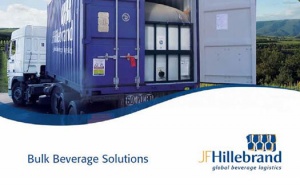JF Hillebrand on how careful planning has helped it rule the waves in bulk shipping of wine

JF Hillebrand, the global logistics distribution company with 58 offices in countries around the world, puts its decision in 2007 to purchase Trans Ocean Distribution has been crucial to its success over the last 10 years.
By investing in TOD it had the foresight to see the potential importance of shipping wine in bulk, particularly in flexitank, as being crucial to future development, according to a report in Australia Business Review.
TOD gave Hillebrand access to not only its innovative flexitanks but also the technology and R&D team behind its three factories in China, Malaysia and South Africa.
But whilst other major shippers and distributors hesitated, Hillebrand was able to push on ahead thanks to its own manufacturing base for flexitanks (and other industry related products).
It placed JF Hillebrand Group in a unique position of being in full control of design, quality and performance of the flexitank.
What’s more it has become one of only two approved suppliers to the Container Owners Association (COA), which many wineries, and shippers will only use to guarantee to safe travel of their wine.
It has helped the company build up an international business, with over 500 regular customers including many of the world's largest supermarket chains and wine producers.
“Shipping wine overseas in bulk can offer advantages compared to finished bottled product both financially and environmentally while preserving the quality of the wine. Indeed the quality of wine arriving overseas in flexitanks is no different to that bottled in Australia, due to the wine being less affected by temperature shifts experienced when crossing the equator en route to the Northern Hemisphere,” said Michael Frogbrook, managing director for JF Hillebrand Australia to Australia Business Review.
In some countries the import duty on bulk wine is lower than bottled wine, giving JF Hillebrand another economic advantage, said the Review, as well as helping to create jobs in the destination countries.
As for the future, Frogbook said: ”In a more a more competitive environment, our clients need integrated logistics solutions enabling them to better anticipate and control the efficiency and global costs of their supply chain in the long term.”
